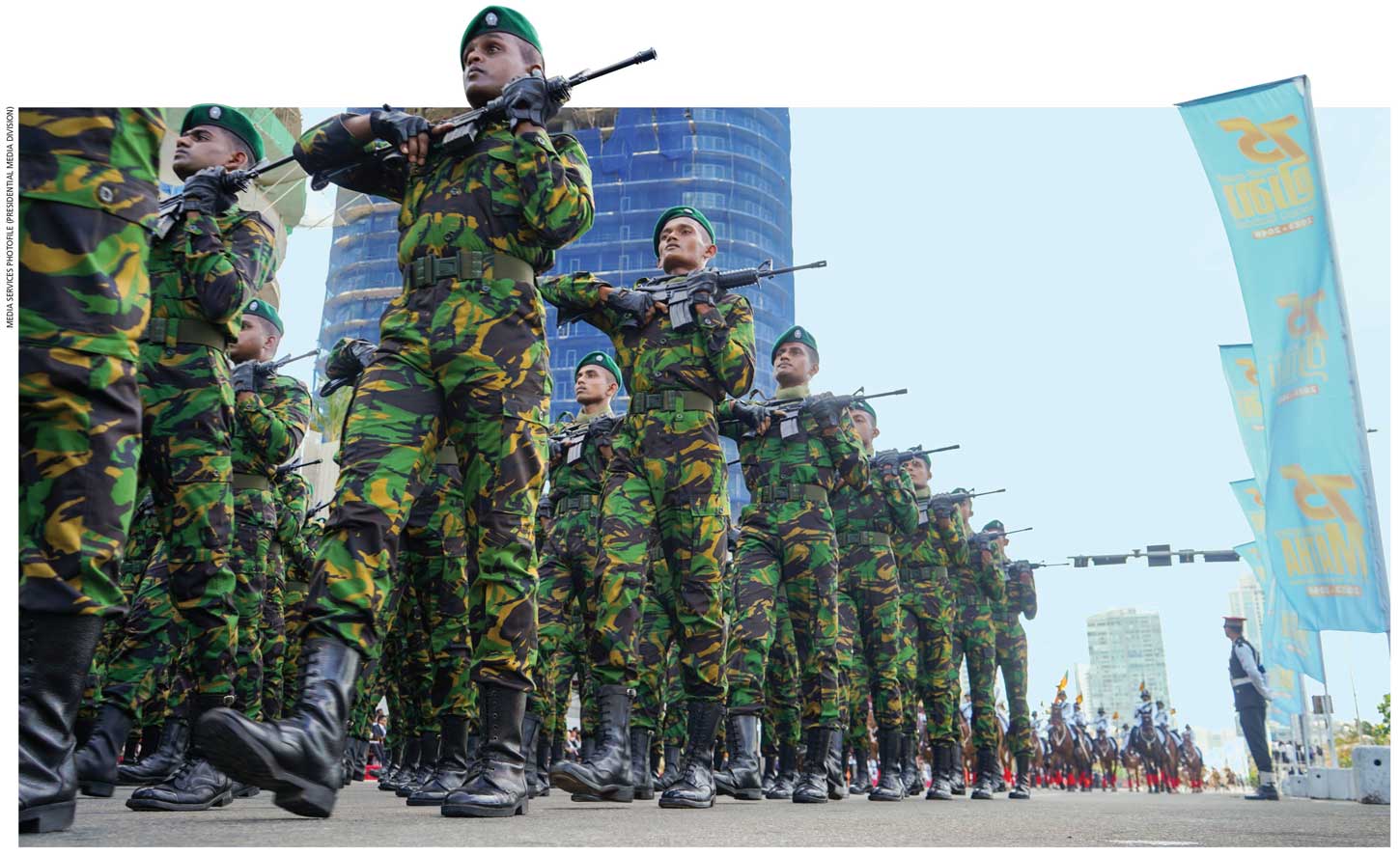STATE OF THE NATION
A SMALL FISH SWIMMING IN TWO DIRECTIONS
Wijith DeChickera watches as the inhabitants of a small pond in a strategic geolocation struggle to stay afloat in eddies of insular making
Since time immemorial, humankind’s symbol for March has been two fish swimming head to tail in pursuit of the same goals; but somehow, being tied together, suggesting that the cohabitants are striving for mutually exclusive ends.
Such is the state of the nation since our independence, following 425 years of colonialism, celebrated last month in a show that cost state coffers Rs. 200 million.
It divided the 22.4 million inhabitants of our tiny backwater over the ceremony’s significance – meaningless or otherwise.
One group held that some pomp and circumstance was necessary to send a strong signal about our ‘sovereignty’ – even from the bottom of a barrel where we are now, bankrupt in more ways than one and with a begging bowl held out to the mercy of passersby with vested interests.
Some even considered the piddling cost of the tamasha including a militarised parade, downplayed with respect to the customary flypast featuring redundant warplanes, incomparable to the larger – arguably less justifiable – price tag of 10 billion rupees for local government (LG) elections.
So what price paltry state funds for essential medicines for the elderly especially or the costly milk of human compassion for 5.7 million islanders including malnourished children shivering before food insecurity?
The LG poll is a bone of contention too, being tugged at both ends by a polity that can’t quite make up its mind whether this is a budgeted for, constitutionally mandated exercise of the electorate’s right to vote for their local councillors; or an example of regional politics whereby influential neighbouring powers twist a small sister nation’s arm into ‘honouring its international commitments’ (i.e. ‘do as we tell you, please; or else…’). Hmm, lines of credit?
There is perhaps even a third option: the international community would wish to see Sri Lanka follow through on the implementation of its 13th Amendment to the Constitution – devolution of power to the maximal extent within a unitary state, which President Ranil Wickremesinghe’s government has committed to – without alienating the web of stake-holders in crossing this minefield.
It is a case of ‘the first two options above’ as we haven’t quite managed to outmanoeuvre regional imperialism and modern-day neocolonialism.
Which takes us beyond the pale of the Indian Ocean into the South China Sea where chronic sabre rattling military exercises underpin a shadowy war spanning political, economic, existential, sociocultural – and now, virtual – dimensions.
It has been fashionable for Sri Lankan apologists of Western-style democracy to indulge in customary China bashing whereby the Hambantota and Port City imbroglios are said to exemplify the infamous debt trap policy of a People’s Republic hell-bent on expanding its Belt and Road Initiative (BRI)…
Or offering soft loans initially, which balloon into harder bargains as time goes by and cash-strapped nations struggle to repay.
But this contention was recently belied by the Export-Import (Exim) Bank of China offering our hamstrung island nation a lifeline in the form of a two-year moratorium on loan repayments – estimated at between US$ 3.6 billion and 7.4 billion dollars and comprising a seemingly manageable yet much debated 15-20 percent of Sri Lanka’s external debt.
The contention is between those who say this is negligible, given that the bulk (some 47%) of loan repayments redounds to market borrowings plus sundry smaller multi and bilateral debt components, and others who maintain that the historically disastrous Sino-segment of Sri Lanka’s external debt places it at the mercy of a cynical lender who takes hard infrastructure in lieu of repayment for dues unpayable.
It is however, another instance in which naysayers riposte by observing this merely showcases China’s desire to play the great game – geopolitics – in the face of avowed support for Sri Lanka from the Paris Club et al of international donors as well as India, who continue to offer moral and fiscal support for a stricken economy ahead of a putative IMF bailout to the tune of US$ 2.9 billion. Staff, where is thy board-level approval already?
There too, this largesse of Western nations and power blocs in the rich men’s club of global economics, international finance and world politics sees Sri Lankan minnows swimming in circles over the meaning of moratoria offered.
Is it gracious goodwill, greedy opportunism or generous dollops of both… topped with the crème of enlightened self-interest whereby none want our tropical paradise to flounder and founder?
At home in our small pond, other contentious issues carry us into swirling eddies of our own Age of Pisces wherein some in society seek safety nets while others advocate widening the tax net.
Is the Advanced Personal Income Tax (APIT) Sri Lanka’s bane or boon? Is the National People’s Power (NPP) the island’s past terror redux or future salvation incarnate? Is the outcome of the poll foreshadowing parliamentary and presidential election results to follow – or will some dark horse pull a rabbit out of a hat?
Time will tell.
Time however, is what we’re all running out of.





